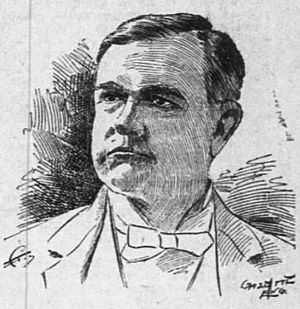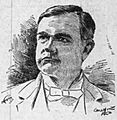Albert R. Anderson facts for kids
Quick facts for kids
Albert R. Anderson
|
|
|---|---|

From the Evening Gazette (Cedar Rapids, Iowa), July 17, 1897
|
|
| Member of the U.S. House of Representatives from Iowa's 8th congressional district |
|
| In office March 4, 1887 – March 3, 1889 |
|
| Preceded by | William P. Hepburn |
| Succeeded by | James P. Flick |
| Personal details | |
| Born | November 8, 1837 Adams County, Ohio |
| Died | November 17, 1898 (aged 61) Hot Springs, South Dakota |
| Political party | Independent Republican |
Albert Raney Anderson (November 8, 1837 – November 17, 1898) was an important American politician. He served one term as a U.S. Representative for Iowa's 8th congressional district. This district is located in southwestern Iowa. He is famous for winning his election to Congress without his own political party's official support. He even defeated a well-known person who already held the position.
Contents
Albert Anderson's Early Life and Military Service
Albert Raney Anderson was born on November 8, 1837, in Adams County, Ohio. Later, he moved with his family to Galesburg, Illinois. He went to local schools and then attended Knox College in Galesburg.
In 1857, Albert moved to Taylor County, Iowa. There, he began to study law. By 1860, he passed his exams and became a lawyer. He started his law practice in Clarinda, Iowa. In 1861, President Lincoln chose him to be the postmaster of Clarinda. This meant he was in charge of the local post office.
Joining the Union Army
Albert Anderson left his postmaster job to join the Union Army. He started as a private soldier in Company K of the 4th Iowa Volunteer Infantry Regiment. He quickly showed bravery and leadership.
- He became a first lieutenant for his brave actions at the Battle of Pea Ridge.
- During the Siege of Vicksburg, he was promoted to captain.
- He served as an assistant Adjutant-General during the Atlanta campaign.
- He rose through the ranks to become a major in his regiment.
- In 1865, he was made a lieutenant colonel.
He left the army in August 1865 and went back to Clarinda, Iowa.
Albert Anderson's Political Career
In 1866, Albert Anderson moved to Sidney, Iowa. He continued his work as a lawyer there. He held several important government jobs.
- From 1868 to 1871, he worked as an assessor of internal revenue. This job involved collecting taxes.
- In 1872, he was chosen as a delegate for the Republican National Convention in Philadelphia. This was a big meeting where the Republican Party chose its candidate for president.
- He served as a district attorney from 1876 to 1880. A district attorney is a lawyer who represents the government in court cases.
- Starting in 1881, he was a state railroad commissioner for one term. This role involved overseeing railroads in the state.
Running for Congress
In 1882, Albert Anderson ran for the 48th United States Congress. He was the Republican Party's choice for Iowa's 9th congressional district. However, he lost that election to a Democrat named William Henry Mills Pusey.
Two years later, in 1884, Albert Anderson did not run himself. But he helped a lesser-known candidate named Joseph Lyman get nominated. Lyman then won the election against Pusey.
Winning as an Independent Republican
In April 1886, Albert Anderson's home county, Fremont County, Iowa, became part of Iowa's 8th congressional district. This district was represented by a Republican named William Peters Hepburn. Anderson decided to run against Hepburn for this seat.
The Republican Party in the district officially supported Hepburn. But Anderson refused to give up. He ran as an "Independent Republican." This meant he was still a Republican, but he ran without his party's official backing.
He campaigned strongly on two main ideas:
- He wanted stricter rules for railroads.
- He believed tariffs (taxes on imported goods) should only be used to raise money for the government, not to protect certain industries.
Because of his ideas, both the Democratic and Greenback parties supported him. Albert Anderson won the election by a large number of votes (2,225 votes). Hepburn's defeat surprised many politicians. It made them realize they needed to listen to public concerns about railroad rules.
Serving in Congress and Later Life
Albert Anderson served in the 50th United States Congress. He voted with the Democratic group when they chose John G. Carlisle for Speaker of the House. However, he still sat with the Republicans in Congress.
In the next election, a different Republican candidate, James Patton Flick, defeated Albert Anderson. Anderson served in Congress from March 4, 1887, to March 3, 1889.
One of his last votes in Congress was for the Enabling Act of 1889. This law helped prepare North Dakota, South Dakota, Montana, and Washington to become states.
After leaving Congress, Albert Anderson moved to Hot Springs in Fall River County, South Dakota, in 1892. He continued to work as a lawyer there. He was elected mayor of Hot Springs in 1895 and 1896. On November 8, 1898, he was elected State attorney for Fall River County.
Albert Raney Anderson died in Hot Springs on November 17, 1898, at the age of 61. He was buried in Sidney Cemetery.
Images for kids


